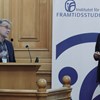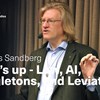anders

Anders Ekholm
I have had the position as vice president and advisor at the Institute for Futures Studies and before that I worked as head of analysis at the Ministry of Social Affairs, with research concerning our

Anders Herlitz
I am a researcher at the Institute for Futures Studies and Professor of Practical Philosophy at Lund University. Previously I was Associate Professor in Practical Philosophy at Stockholm University an

Anders Sandberg
My research focus on issues of the very long-term future, technologies that can change the human condition, low-probability high-impact risks, and how to reason about such uncertain domains. More spec

Demokratin och det nya offentliga samtalet - Anders Ekström
Del av seminariet Demokratin och det nya offentliga samtalet – om nya mediavanor, ökad polarisering och förändrade maktförhållanden. Anders Ekström, professor i idé- och lärdomshistoria vid Uppsal

Globala katastrofer och existentiella risker. Intervju med Anders Sandberg
Kärnvapenkrig, pandemier, istider och robotar smartare än människan. Både naturen och vi själva kan försätta oss i situationer där mänskligt liv hotas på en större skala. Här intervjuas forskaren Ande
The Swedish Conservative Party and the Welfare State: Institutional Change and Adapting Preferences
The paper argues that the Swedish ‘neo-liberal’ party (Moderaterna) has adapted its policies due to the popularity of the ‘universal’ Swedish welfare state. Over time, the party in its rhetoric and id

Anders Sandberg: Serf's up - Law, AI, Singletons and Leviathan
Research seminar with Anders Sandberg, Ph.D. in computational neuroscience, researcher at IFFS and Senior Research Fellow at the Future of Humanity Institute, Oxford University. Abstract A key problem

Systemic risk models as a policy prediction tool with Anders Sandberg
Presentation at the workshop "AI and autonomous decision making" at the Institute for Futures Studies in Stockholm, October 2017.
Anders Sandberg: The Survival Curve of Our Species: Handling Global Catastrophic and Existential Risks
Anders Sandberg, Future of Humanity Institute, Oxford University ABSTRACTHow likely is humanity to be severely damaged by a global disaster, or go extinct? How bad would it be? This talk will review wo
Near-repeat shootings in contemporary Sweden 2011 to 2015
Security Journal, Volume 31, Issue 1, pp 73–92, doi:10.1057/s41284-017-0089-y Abstract The concept of near-repeat patterns illustrates how crimes are clustered in space and time, with a crime event often s








